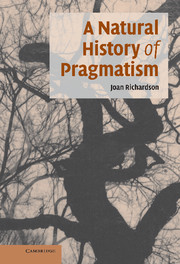Book contents
- Frontmatter
- Contents
- Preface
- List of abbreviations
- 1 Introduction: frontier instances
- 2 In Jonathan Edwards's room of the idea
- 3 Emerson's moving pictures
- 4 William James's feeling of if
- 5 Henry James's more than rational distortion
- 6 Wallace Stevens's radiant and productive atmosphere
- 7 Gertrude Stein, James's Melancthon/a
- Notes
- Bibliography
- Index
1 - Introduction: frontier instances
Published online by Cambridge University Press: 22 September 2009
- Frontmatter
- Contents
- Preface
- List of abbreviations
- 1 Introduction: frontier instances
- 2 In Jonathan Edwards's room of the idea
- 3 Emerson's moving pictures
- 4 William James's feeling of if
- 5 Henry James's more than rational distortion
- 6 Wallace Stevens's radiant and productive atmosphere
- 7 Gertrude Stein, James's Melancthon/a
- Notes
- Bibliography
- Index
Summary
Every science must devise its own instruments. The tool required for philosophy is language. Thus philosophy redesigns language in the same way that, in a physical science, pre-existing appliances are redesigned. It is exactly at this point that the appeal to facts is a difficult operation. This appeal is not solely to the expression of the facts in current verbal statements. The adequacy of such sentences is the main question at issue. It is true that the general agreement of mankind as to experienced facts is best expressed in language. But the language of literature breaks down precisely at the task of expressing in explicit form the larger generalities which metaphysics seeks to express.
Alfred North Whitehead, Process and RealityTHUS, IN THE BEGINNING, ALL THE WORLD WAS AMERICA
Each of the chapters to follow focuses on an aspect of the life of the mind in America as it develops the habit we know as Pragmatism, specifically, the method of thinking described by William James and inflected by radical empiricism. My subjects are figures whose works serve as what Charles Darwin in his N Notebook called, noting his borrowing from Francis Bacon, “frontier instances”: “cases in which we are enabled to trace that general law which seems to pervade all nature – the law, as it is termed, of continuity.”
- Type
- Chapter
- Information
- A Natural History of PragmatismThe Fact of Feeling from Jonathan Edwards to Gertrude Stein, pp. 1 - 23Publisher: Cambridge University PressPrint publication year: 2006



